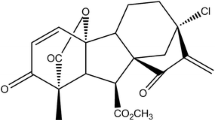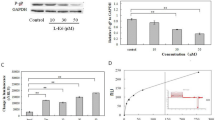Abstract
Objective
We supposed that it will be a promising strategy to “prevent” multidrug resistance (MDR) instead of “reversing” it. This study was designed to investigate the potency of curcumin to prevent the acquired drug resistance induced by adriamycin (ADM) in native K562 cells.
Methods
K562 cells were pretreated with curcumin or 0.5% DMSO for 24 h and then were co-incubated with ADM. P-glycoprotein (P-gp) and mdr1 mRNA levels were analyzed separately by flow cytometry and quantitative real-time RT-PCR. The intracellular Rh-123 accumulation was also detected by flow cytometer. Finally, we performed a MTT assay to determine the ADM-induced cytotoxicity with or without pretreatment of curcumin.
Results
P-gp and mdr1 mRNA expressions were elevated in the ADM alone group. While in the curcumin pretreated groups, the induced P-gp and mdr1 mRNA levels gradually decreased with increasing curcumin concentrations, and the Rh-123 accumulation level was almost recovered close to the control group’s. Finally, the MTT colorimetric assay verified the enhanced effect of curcumin on ADM-induced cytotoxicity.
Conclusion
Our present study suggested that curcumin exhibits the novel ability to prevent the up-regulation of P-gp and its mRNA induced by ADM. The prevention capacity is also functionally associated with the elevated intracellular drug accumulation and parallel enhanced ADM cytotoxicity. We revealed a novel function of curcumin as a potential drug resistance preventor.
Similar content being viewed by others
References
Kartner N, Riordan JR, Ling V. Cell surface P-glycoprotein associated with multidrug resistance in mammalian cell lines. Science 1983; 221: 1285–1288.
Gottesman MM, Pastan I. Biochemistry of multidrug resistance mediated by the multidrug transporter. Annu Rev Biochem 1993; 62:385–427.
Cole SP, Bhardwaj G, Gerlach JH, et al. Overexpression of a transporter gene in a multidrug-resistant human lung cancer cell line. Science 1992; 258:1650–1654.
Egashira M, Kawamata N, Sugimoto K. P-Glycoprotein expression on normal and abnormally expanded natural killer cells and inhibition of p-glycoprotein function by cyclosporin A and its analogue, PSC833. Blood 1999; 93:599–606.
Tsuruo T, Iida H, Tsukagoshi S, et al. Overcoming of vincristine resistance in P388 leukemia in vivo and in vitro through enhanced cytotoxicity of vincristine and vinblastine by verapamil. Cancer Res 1981; 41:1967–1972.
Limtrakul P, Anuchapreeda S, Buddhasukh D. Modulation of human multidrug-resistance MDR-1 gene by natural curcuminoids. BMC Cancer 2004; 4:13.
Xu D, Lu Q, Hu X. Down-regulation of P-glycoprotein expression in MDR breast cancer cell MCF-7/ADR by honokiol. Cancer Lett 2006; 243:274–280.
Sakaeda T, Nakamura T, Hirai M, et al. MDR1 Up-regulated by apoptotic stimuli suppresses apoptotic signaling. Pharm Res 2002; 19:1323–1329.
Gottesman MM, Ling V. The molecular basis of multidrug resistance in cancer: the early years of P-glycoprotein research. FEBS Lett 2006; 580:998–1009.
Zatelli MC, Luchin A, Tagliati F, et al. Cyclooxygenase-2 inhibitors prevent the development of chemoresistance phenotype in a breast cancer cell line by inhibiting glycoprotein p-170 expression. Endocr Relat Cancer 2007; 14:1029–1038.
Shen H, Xu W, Chen Q, et al. Tetrandrine prevents acquired drug resistance of K562 cells through inhibition of mdr1 gene transcription. J Cancer Res Clin Oncol 2010; 136:659–665.
Pan Q, Lu Q, Zhang K, et al. Dibenzocyclooctadiene lingnans: a class of novel inhibitors of P-glycoprotein. Cancer Chemother Pharmacol 2006; 58:99–106.
Sambrook J, Fritsch EF, Maniatis T. Molecular cloning: a laboratory manual. Cold Spring Harbor: Cold Spring Harbor Laboratory, 1989.
Schiedlmeier B, Kühlcke K, Eckert HG, et al. Quantitative assessment of retroviral transfer of the human multidrug resistance 1 gene to human mobilized peripheral blood progenitor cells engrafted in nonobese diabetic/severe combined immunodeficient mice. Blood 2000; 95: 1237–1248.
Li DQ, Pan LH, Shao ZM. Reversal effects of mifepristone on multidrug resistance(MDR) in drug-resistant breast cancer cell line MCF7/ADR in vitro and in vivo. Chin J Cancer Res 2004; 16:93–98.
Fu L, Liang Y, Deng L, et al. Characterization of tetrandrine, a potent inhibitor of P-glycoprotein-mediated multidrug resistance. Cancer Chemother Pharmacol 2004; 53:349–356.
Fu JX, Wang W, Cen JN, et al. Retroviral mediated efficient transfer and expression of multiple drug resistance gene to human leukemia cells. Chin J Cancer Res 2000; 12:120–124.
Hu XF, Slater A, Wall DM, et al. Cyclosporin A and PSC 833 prevent up-regulation of MDR1 expression by anthracyclines in a human multidrug-resistant cell line. Clin Can Res 1996; 2:713–720.
Yague E, Armesilla AL, Harrison G, et al. P-glycoprotein (MDR1) expression in leukemia cells is regulated at two distinct steps, mRNA stabilization and translational initiation. J Biol Chem 2003; 278: 10344–10352.
Duvoix A, Blasius R, Delhalle S, et al. Chemopreventive and therapeutic effects of curcumin. Cancer Lett 2005; 223:181–190.
Sharma RA, Gescher AJ, Steward WP. Curcumin: the story so far. Eur J Cancer 2005; 41:1955–1968.
Richter-Reichhelm HB, Schulte AE. Results of a cyclosporin A ring study. Toxicology 1998; 129:91–94.
Anand P, Sundaram C, Jhurani S, et al. Curcumin and cancer: an “old-age” disease with an “age-old” solution. Cancer Lett 2008; 267:133–164.
Wilken R, Veena MS, Wang MB, et al. Curcumin: A review of anti-cancer properties and therapeutic activity in head and neck squamous cell carcinoma. Mol Cancer 2011; 10:12.
Giladi N, Kazanov D, Shpitz B, et al. Curcumin potentiates the pro-apoptotic effects of sulindac sulfone in colorectal cancer. Expert Opin Investig Drugs 2010; 19(Suppl 1):S117–S124.
Su CC, Lin JG, Li TM, et al. Curcumin-induced apoptosis of human colon cancer colo 205 cells through the production of ROS, Ca2+ and the activation of caspase-3. Anticancer Res 2006; 26(6B):4379–4389.
Su CC, Chen GW, Lin JG, et al. Curcumin inhibits cell migration of human colon cancer colo 205 cells through the inhibition of nuclear factor kappa B /p65 and down-regulates cyclooxygenase-2 and matrix metalloproteinase-2 expressions. Anticancer Res 2006; 26(2A):1281–1288.
Chen HW, Lee JY, Huang JY, et al. Curcumin inhibits lung cancer cell invasion and metastasis through the tumor suppressor HLJ1. Cancer Res 2008; 68:7428–7438.
Lin YG, Kunnumakkara AB, Nair A, et al. Curcumin inhibits tumor growth and angiogenesis in ovarian carcinoma by targeting the nuclear factor-kappaB pathway. Clin Cancer Res 2007; 13:3423–3430.
Anuchapreeda S, Leechanachai P, Smith MM, et al. Modulation of P-glycoprotein expression and function by curcumin in multidrug-resistant human KB cells. Biochem Pharmacol 2002; 64: 573–582.
Chearwae W, Wu CP, Chu HY, et al. Curcuminoids purified from turmeric powder modulate the function of human multidrug resistance protein 1 (ABCC1). Cancer Chemother Pharmacol 2006; 57: 376–388.
Li Y, Revalde JL, Reid G, et al. Modulatory effects of curcumin on multi-drug resistance-associated protein 5 in pancreatic cancer cells. Cancer Chemother Pharmacol 2010; [Epub ahead of print].
Author information
Authors and Affiliations
Corresponding author
Additional information
This work was supported by the National Natural Science Foundation of China (No. 30901741), and Zhejiang Provincial Natural Science Foundation (No. Y2080308).
Rights and permissions
About this article
Cite this article
Xu, D., Tian, W. & Shen, H. Curcumin prevents induced drug resistance: A novel function?. Chin. J. Cancer Res. 23, 218–223 (2011). https://doi.org/10.1007/s11670-011-0218-9
Received:
Accepted:
Published:
Issue Date:
DOI: https://doi.org/10.1007/s11670-011-0218-9




